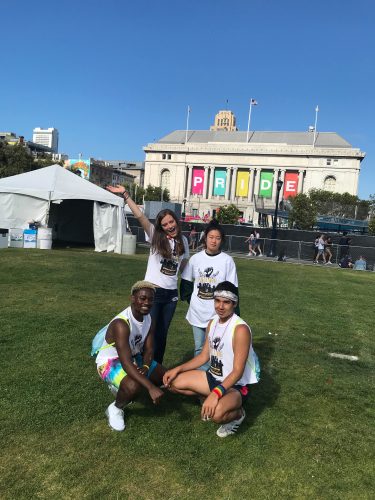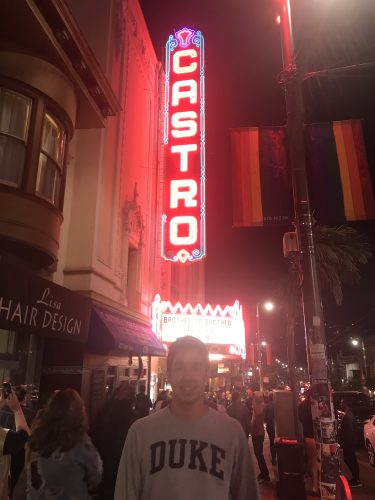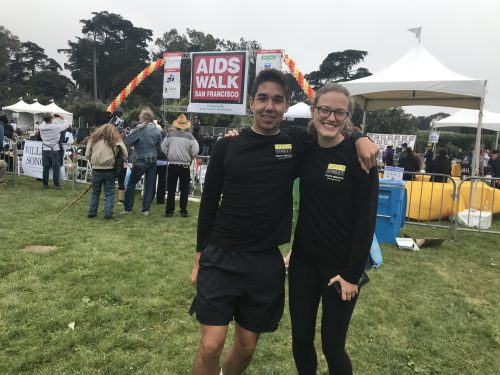Texas to California
I grew up in an upper middle-class suburb of Houston, Texas, in a town once nicknamed the “city of churches.” My high school taught abstinence-only sex-ed and my principals and coaches consistently made homophobic comments. I spent my teenage years suppressing my desires and denying my sexuality. It wasn’t until senior year I finally whispered the words “I’m gay” to myself.
Growing up, I never met an adult gay person, and I never met a gay couple for the seven years I lived in Houston. Moving to Duke was a nice break from that, but I was still in one of the worst gay dating areas in the country. I developed close friendships with other gay people, but I relied on media and social networks to experience the larger gay culture.
Duke Engage San Francisco has been a way for me to experience the LGBTQ community, in all of its entirety. It allowed me to understand the root causes of hardships, explore the historical memories of gay activism, and observe liberated gay communities. The first time I strolled through the Castro, the historical gay district, I was baffled by the number of gay couples walking past me, maybe a hundred in an hour. Their happiness was contagious and I felt like I was in a dream. When I volunteered at a queer film festival in the historic Castro Theater, again I saw hundreds of outwardly queer people, dressed up in colorful costumes or proudly holding hands with their partner.
I work at Larkin Street Youth Services, where I help staff carry out supportive services for youth experiencing homelessness, which over half identify as queer. San Francisco is a safe haven for queer identities, but a dystopia for economic inequality. Where I work is a block away from the historic site of the Compton Cafeteria riots, the first act of LGBTQ resistance against police in the United States. It is also central to the transgender cultural district, the only of its kind in the U.S. I learned about this side of queer history in a course I took at Duke, and to be in such proximity is fascinating. Every time I walk to work, I am experiencing a birthplace of boldness, creativity, and resilience.
Allyship Gone Awry
This summer has been incredibly beneficial to me, as a gay man, because I have an opportunity to work with members of my own community and address social issues that affect my community. It also allows me to experience the joys of being gay that I rarely feel on day-to-day basis. At my placement, only one other—out of seven—students identify as LGBTQ. Furthermore, the population we serve is mainly Black and brown, and none of the six straight students have one of those identities. This affects the way our group is embraced by a staff and community that is largely queer and POC, and how I contemplate the ethics of our presence.
I chose a domestic program to avoid the white savior complex of international service learning: traveling to a foreign community you share nothing in common with and expecting that your elite education will solve intergenerational poverty. In this program, I have discovered a new phenomenon, the “straight savior complex”. It is the way straight allies look at the LGBTQ community with pity, and reward themselves for an accepting attitude that should already be a given.
Now, empathy can be a powerful tool, that drives necessary fundraising and gift-giving; while pity creates a superiority complex that does more harm than good. The straight savior complex results in straight individuals with no background in LGBTQ issues or social justice believing that their simple presence and goodwill is a blessing for the queer community. It results in the groups of straight corporate employees riding rainbow floats at pride, before returning to homes that have gentrified historic neighborhoods. It results in politicians using the LGTBQ community as a talking point and a symbol of their progressiveness. It results in institutions expecting praise and consumership from the LGBTQ community for being “tolerant.” It results in a service learning program that “helps homeless LGTBQ youth” and sends mainly straight, economically privileged Duke students to address these issues.
My gay summer has been a blessing. It deepened the ways I think about the queer community and social justice in America. I gained an in-depth look at nonprofit organizations working to address social issues. I learned that I value gay friendship dearly, and that being surrounded by straight peers can be lonely. Most importantly, I’ve been shown the many ways I can contribute to my community in my daily and professional life. I’m excited for the rest of it.



